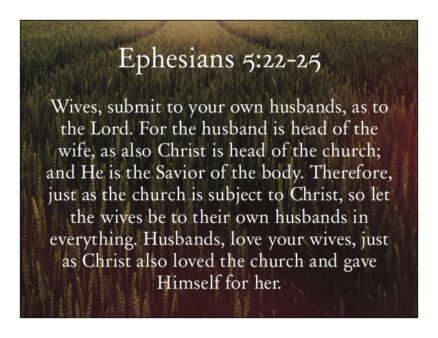I emailed the pastor of the church I’ve been attending:
I know Refuge is complimentarian, but what to what degree? On a continuum, there might be “men and women are fairly equal, but women don’t preach” on one side, and on the other might be “women should remain silent, submissive, barefoot, and pregnant” on the other. That’s a very broad spectrum. I know you don’t fall on either side, but where in the middle of that does Refuge fall?
Regarding Ephesians 5, could you please define ‘submission’ as you understand it?
Yes, I’ve known they are complementarian, but the subject had never come up and women are very involved in the church, so it was easy to ignore. His response was interesting:
Mary, those are great questions!
For complementarian, we do believe that men and women are created equal (Gen 1:26-28) but they are created different (Gen 2). We were given different roles, but we are all gifted in different and unique ways. In Genesis 3 we see the abuse of those roles, especially in the curse – “Your desire will be for your husband and he will rule over you.” Those are abuses of the way God designed us to be…working together and in harmony. So, how that all plays out in our world is tricky, but it is a posture of our hearts. So, we believe that the role of “elder” is reserved for men, not at the top of the food chain, but the bottom. To carry weight, to stand in the gates and protect the sheep from wolves. As elders, we believe that if we are doing our roles well, that every person in the church (male and female) ought to feel the freedom to serve in every other capacity. We don’t want to lord it over people, we want to serve and guide and protect.
As for “submission,” we are all called to submit, but it’s more invitational and not coercive. That means we see submission as a willful act, not a forced act…if that makes sense. In a marriage situation, that means that husband and wife work together, but the husband takes on the accountability to lead well and his wife helps him lead well – encouraging him when he leads well and opposing him (not in rebellion, but in encouragement) when he is doing things that are destructive to himself, to her or to their marriage. We see that playing out very similar in the role of elder.
Paul, in Ephesians 5 says that the church is to “submit” to one another. Wives are to submit – willfully trust and/or fight to trust her own husband (not all men), but also, that is balanced by the call to men to “give up their lives” for their wife. We do not believe that means women are to be silent, but are to be “helpers” as God called Eve in Genesis. I hope that makes sense. There are a lot of loaded words in there 🙂 so please ask for further clarity if needed.
The first sentence feels a bit condescending… and a lot fake. Women are “equal but different”… to a degree this might be OK. There are physical differences between men and women, and every person is different. I’d never realized that some translations say that the woman will desire to control her husband, and never thought of the verse as a warning before. It is these sorts of things that make me enjoy being there, even if I don’t agree with them on many things. That he adds that men are to be elders “to carry weight, to stand in the gates and protect the sheep from wolves…” is very triggering to me, since that was taught in the unhealthy group I came out of. Pastors in my experience are undershepherds who tend to run at the first sign of a wolf. And sometimes people need to be protected from them. And people aren’t sheep. The Lord is my shepherd….
Yes, there are a lot of loaded words there… and a number that are triggering to me. My background includes a LOT of misuse of the words and verses surrounding “submission”, “shepherd”, “accountability”, and even “protect”, to the hurt of those who had trusted the leaders using them.
I’m not sure I understand what you mean by this statement: ‘In Genesis 3 we see the abuse of those roles, especially in the curse – “Your desire will be for your husband and he will rule over you.”‘ I thought this was a statement of fact, a consequence of sin, rather than abuse of roles or part of the curse. (It’s my understanding that the ground was cursed and the serpent was cursed, but not Adam and Eve. Though sin did carry consequences, God didn’t curse them.) Or do you understand the passage more as the NLT puts it: “And you will desire to control your husband, but he will rule over you.” (I was a little surprised to find that as a translation, having understood it to mean her focus would be on her husband, on gaining his attention and affection, and that he would have the authority and sole decision making ability in the marriage. It wasn’t a verse I’d looked up or consider I might need to “untangle” from possibly poor teaching.) Could you explain?
Notice he doesn’t respond fully:
Yeah, I know those words are loaded and I would rather help redeem them than just dump them, but I am so very sorry that you’ve experienced the dark side of those words. That is, unfortunately, way too common.
The statement from Genesis 3, the relationship between Adam and Eve was also broken in the rebellion. In Genesis 2 we see them work together in harmony. Adam did not “rule over” her and Eve’s desire was not “for her husbands position.” They were secure, they worked together, they thrived in their relationship with God and with each other. I think we see the redemption of that in Ephesians 5. Part of that brokenness was each of them abusing or abandoning the way God designed them to work together. So, instead of working in harmony, their relationship became contentious. Adam (man) would be tempted to abuse his authority/headship, to use it for personal gain or self-protection. I think we have all (I hope) experienced some good practices of authority, but we usually don’t recognize it as authority. If you’ve ever had a good teacher or boss or someone who you knew would support you and you felt a sense of freedom with them. A good boss, for example, doesn’t threaten or govern with fear, but helps to push or encourage you to be your best. That’s good authority.
On the other side, Eve is tempted to “desire her husband’s position.” I think the temptation there kind of carries an “undermining” tone.
These discussions might be better over coffee or something so we can give a gentler tone to some of these words, because my fear is that you might hear these words wrong, and I really don’t want you to. I want you to feel confident and cared for and it sounds like you’ve experienced a lot of the opposite of that.
I am sorry for your past experiences. I really am. I appreciate you asking questions and I want you to feel a freedom to do that. We try as hard as we can to not have any “back rooms” or “hidden agendas” or anything that we hide up front. So consider that an invitation to keep asking and clarifying.
Hmmm… dump them? I’m not sure where he came up with that. The idea that Genesis was redeemed in Eph 5 is something I don’t understand. The sudden turn to “good” authority irritates me, too, mostly because I don’t see the point within the conversation unless it is to draw a parallel: there are good bosses and teachers so therefore there must be good authoritarian husbands. Hopefully I’m wrong, but to then move to Eve and parallel to a negative reinforces my distrust. Then comes the invitation to discuss in person… and again a condescending tone, followed by a statement out of the blue that they try not to have any hidden agendas. Once again, this raises red flags.
I responded, and have not received a response in nearly 24 hours:
Thanks for the responses. I don’t think most ‘authorities’ who support and encourage us to do our best see themselves as authorities. They lead, but they are just as apt to follow because they don’t see their leadership as a position and don’t view it with any permanence. Because of that, they are free from the fears and insecurities of authoritarians and freer still to do all things well, as are those around them. At least that’s been my observation.
I have learned good things [while at this church]… some things taught and some that drove me to study things out on my own or piqued my interest in a topic that I hadn’t already untangled. There is quite a bit that is believed that I don’t agree with, but I’m used to agreeing to disagree as long as I’m learning and don’t feel threatened or shunned for coming to different conclusions. My past experience is what it is. However, because of it, and because of what I learned from it, I am more cautious… and wiser, I hope.
I am available for coffee or whatever… But fair warning that any discussion of these things will not end or even slow my questions.
I may be too hard on him. He may have triggers from what I said as well. I’ve learned at this church, which is good. I’ve begun to want to study and pray. Those are good things. And there is no church in existence where I wouldn’t see red flags. What do you see? What do you think of my questions and his responses?
A Conversation With A Pastor, Part 2
********
Shop at our Amazon store! As an Amazon Influencer, this website earns from qualifying purchases.











